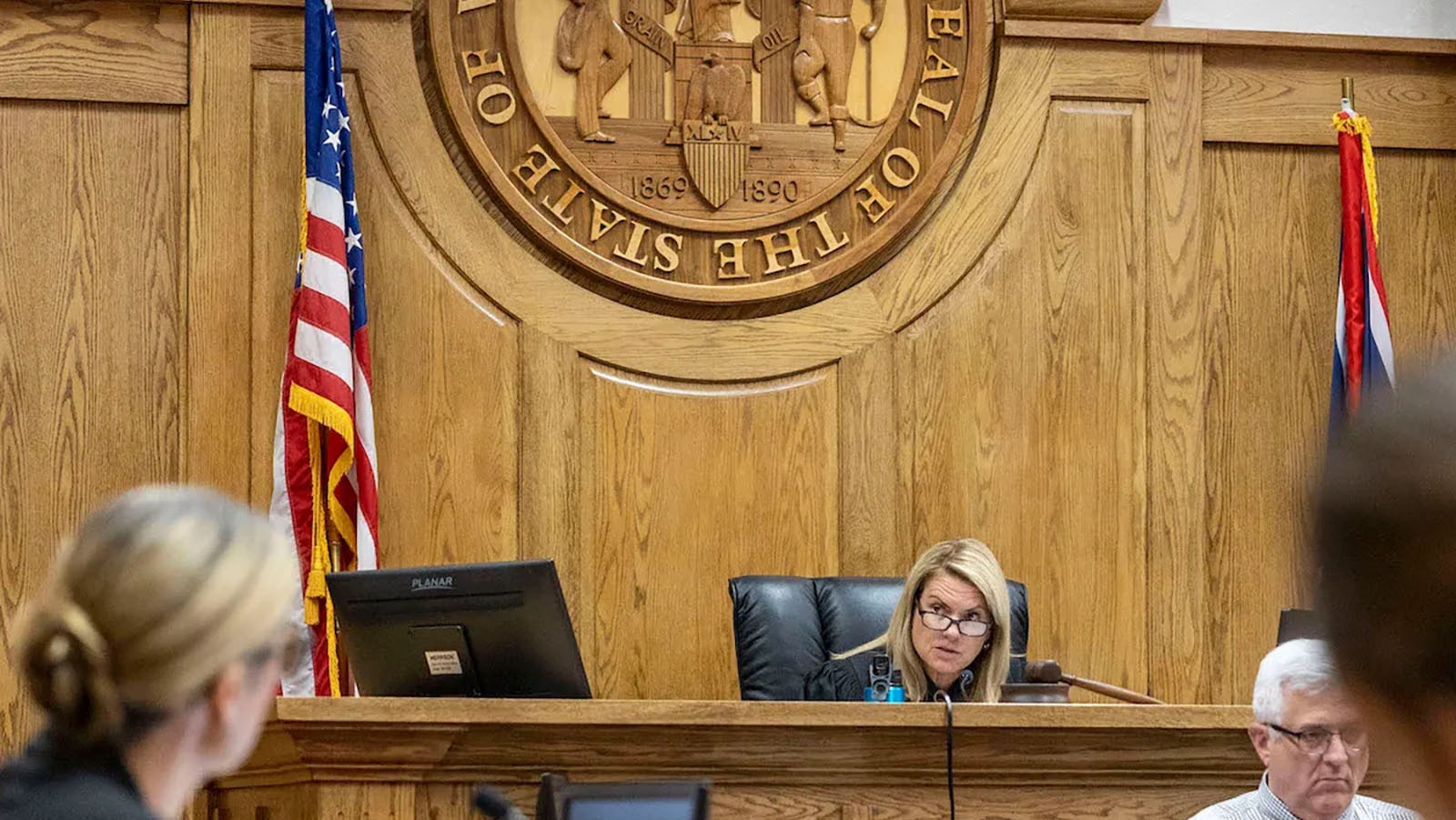Threatening or intimidating jurors in Wyoming is illegal, and those who may try that with judges in Wyoming could face serious prison time under a bill the Legislature is considering.
The draft bill would spell out specifically that it’s illegal to influence or intimidate judges. Those found guilty could be convicted of a felony carrying up to 10 years in prison and a fine of up to $5,000.
Sixth Judicial Circuit Court Judge Wendy Bartlett shared a story with the Joint Judiciary Committee on Monday about how she received a bomb threat at her home at around 10:30 p.m. on Aug. 2. A Gillette police officer called to advise that an inmate at the Campbell County jail had just reported to jail officers that he had arranged for someone to plant a bomb at Bartlett’s home.
Bartlett said she was the judge for the person’s six pending cases.
Officers were already outside her home, but Bartlett said she and her husband sent them away without performing a bomb search. They did their own search and found nothing, but the next day they bought security cameras.
“My experience is just one of many judges around Wyoming have dealt with frequently,” Bartlett said. “I did sign on for this job and maybe this situation, but my husband and children certainly didn’t. It’s time to protect our public officials.”
Current state law prohibits influencing, intimidating or impeding jurors, witnesses and court officers, but it is not clear if these protections extend specifically to judges.
The proposed law would cover judges at all levels of state government in Wyoming from chancery judge to supreme court justice.
Expanding Threats
Wyoming Supreme Court Justice John Fenn chairs the Wyoming Court Security Commission and told the Judiciary Committee that most of the threats and intimidation judges in Wyoming face are vague and unrelated to a specific case.
“We have mentally ill people showing up on people’s doorsteps, we have disgruntled parties of domestic relations,” he said.
Laramie County District Court Judge Catherine Rogers said threats made against members of the judicial branch have exploded nationwide.
“I’m not sure what I could say to stress the concerns that we as judges have in doing the work that we do,” Rogers said. “While it is not our job to make people mad … the work that we do makes very dangerous people mad.”
Before taking her current role in 2009, Rogers was a circuit court magistrate, a civilian officer who administers the law. As a magistrate, she received a threatening letter from someone in a civil case she was presiding over.
“Anybody who does this work, regardless of the title you bestow, is subject to threats and likely has received some type of threat,” she said.
She also mentioned the story of a Texas judge who came to Wyoming in April and spoke with court staff about her experience. This judge went to a high school football game with her son and was ambushed with an assassination attack in their driveway upon returning home. The judge experienced significant skin damage, lost her pinky finger and was out of work for three months.
The child of a New Jersey federal judge was gunned down at home in 2020. The shooter was a disgruntled attorney who had been stalking the judge for years and knew all her family’s whereabouts.
“Things like that happen here too in Wyoming,” Rogers said.
Rogers mentioned how one of her colleagues started being harassed through writing at work and home by a disgruntled civil litigant with a history of mental illness. Her colleague became so concerned that he installed home security equipment at his residence.
One weekend he walked out of his home and there was his harasser, standing on the front porch.
“My colleague’s young child was standing right behind him,” Rogers said. “It was a terrifying event for him.”
He called law enforcement to the scene, which responded quickly. Through their investigation of the incident, they learned the harasser had left the home but was headed back to it.
Rogers said she also knows of female court employees who have been threatened with sexual assault and approached in public spaces. Every time her child answers the door, Rogers said she’s terrified.
“Do I tell him that judge’s sons get shot at the front door? Do I tell him don’t answer the door it’s dangerous, be afraid?” Rogers questioned. “We as judges and parents of children have a number of challenges just to balance these significant security issues in our desire and commitment to performing our jobs.”
Why Not Charge As Something Else?
To date, no charges have been filed against the person who made the threats against Bartlett.
Although Fenn said assault charges could possibly be made in response to the incident, he believes the proposed legislation would more directly address incidents like these, and that most county attorneys see the current law against intimidation and threats as only applying to jurors.
Johnson County Attorney Tucker Ruby, also president of the Wyoming County Attorneys Association, said one of the challenges about prosecuting cases like these is threats against judges often come from a third party rather than an individual, as was the case with Bartlett. He recommended adding language clarifying direct and indirect threats and stalking.
State Sen. Ed Cooper, R-Thermopolis, expressed concern that the legislation doesn’t go far enough to adequately protect judges. Fenn said ideas have been proposed in the past to provide state funding for home security for judges, but that hasn’t gained much traction. He also said most judges spend their own money to bolster their security.
Some hardline conservatives have expressed trepidation about bills like these, arguing they create a special class of protected citizens. State Rep. Mark Jennings, R-Sheridan, questioned Bartlett about why the person who threatened her wasn’t simply found in contempt of court.
Bartlett answered that she immediately moved that person’s cases to another judge and that the remedies for punishing contempt are fairly limited when someone is already in custody.
“I had a conflict of interest,” she said. “It would be inappropriate for me to hold him in contempt when he’s threatening my life.”
Immediate family members of judges also are covered. Other states have already addressed the issue of intimidation or tampering with judge’s family members. In Wisconsin, a stepchild of a judge is covered under this. In Arizona and Colorado, someone living in a judge’s household is protected.
Rep. Jeremy Haroldson, R-Wheatland, said he supports the legislation in its purpose, but mentioned the ongoing legal challenges that Hunter Biden, son of President Joe Biden, is facing as a concern that the legislation could shield family members from legal prosecution. Fenn said there is potential the law could be interpreted in that regard.
“If one of us on this line (committee) made a bomb threat we’d probably have some legal action taken against us,” Haroldson said. “I just don’t want it to be a situation where we create an unwanted or unwarranted consequence.”
Other Protections
Fenn also recommended including other court staff like clerks, court commissioners and municipal judges in the protection. Rep. Ember Oakley, R-Riverton, a prosecutor from Fremont County, took it even further and recommended adding attorneys to the law.
The committee will continue discussing the legislation at its next meeting in November.
At this meeting, separate legislationalso willbe discussed that would prohibit publication of a judge’s personal information as an attempt to threaten them. A few lawmakers suggested combining this legislation with the broader threatening legislation that was discussed.
Leo Wolfson can be reached at leo@cowboystatedaily.com.





